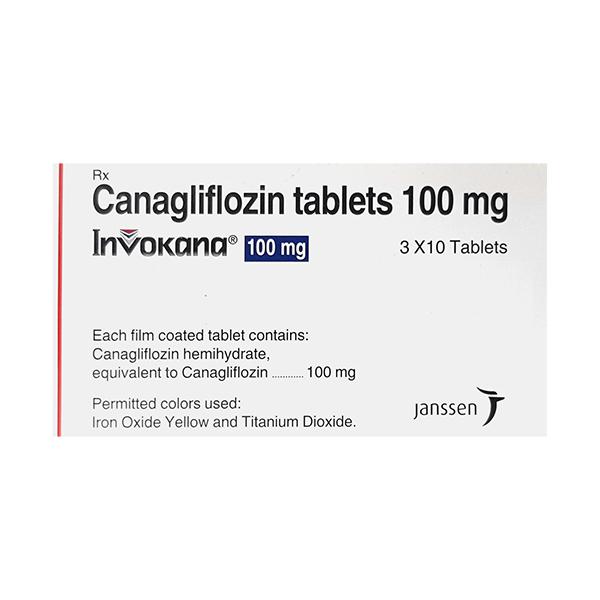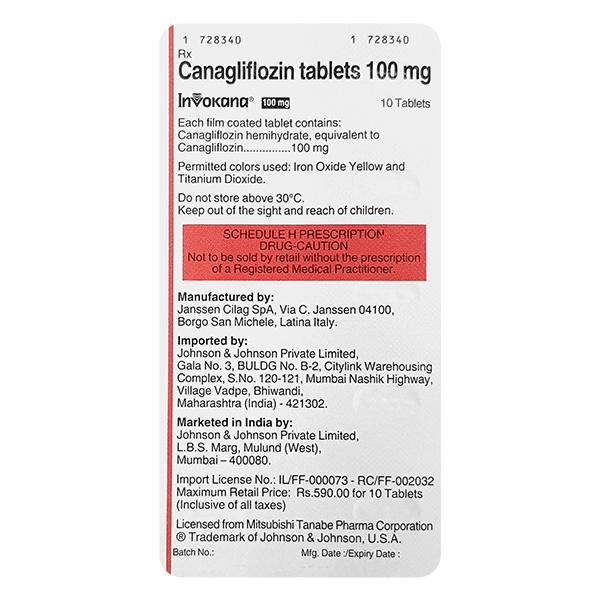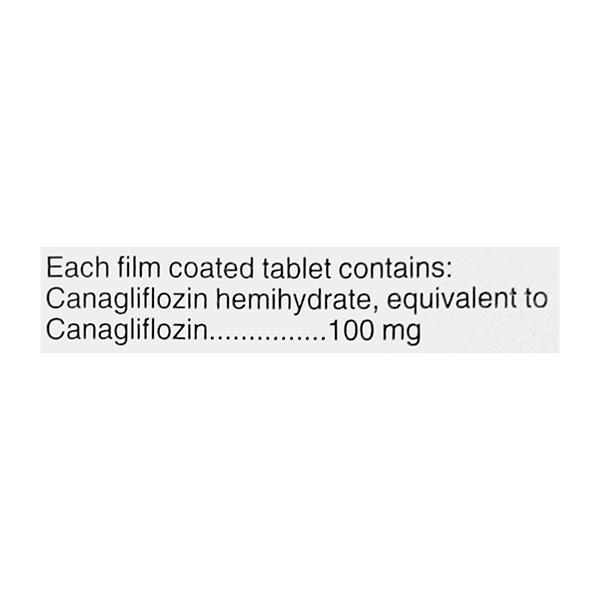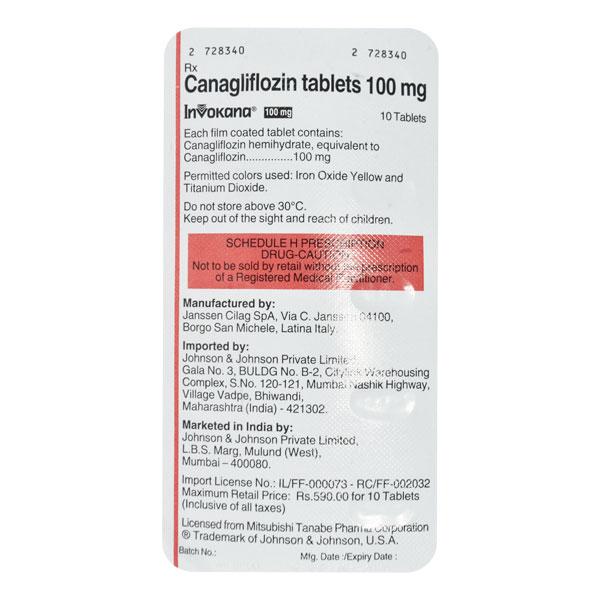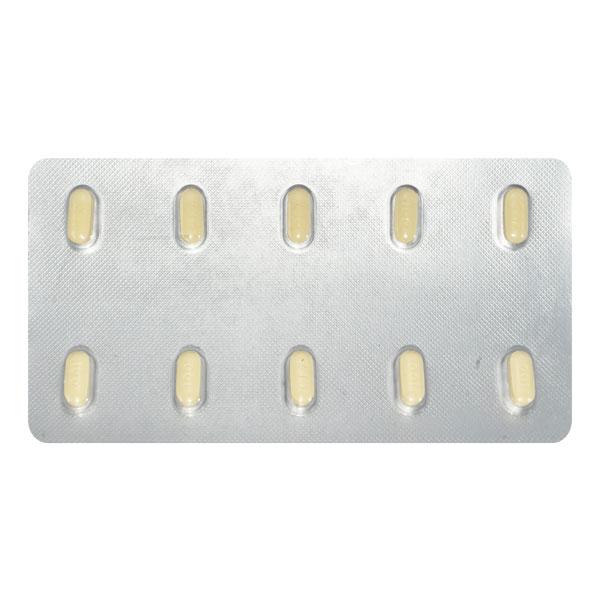

Netmeds First Membership
Quick Links
Introduction About INVOKANA 100MG TABLET
INVOKANA 100MG TABLET contains Canagliflozin which belongs to the group of medicines called Anti-diabetic drugs. It is used to manage type 2 diabetes mellitus along with diet and exercise in adults. It is also used to reduce the risk of heart disease and slow down worsening of kidney function in patients with type 2 diabetes mellitus.
Type 2 diabetes is a condition in which your body fails to make enough insulin and the insulin that your body produces does not work as well as it is expected to. Symptoms include increased thirst, urination and hunger, blurry vision, numbness in hands or feet or tiredness.
INVOKANA 100MG TABLET is not recommended for use in patients who are on kidney dialysis and with type-1 diabetes. It should be used with caution in patients with low blood pressure, severe liver, kidney and heart disease, stroke. Consult your doctor before taking it.
INVOKANA 100MG TABLET is not recommended for use in pregnant and breast-feeding women. Consult your doctor before taking it.
INVOKANA 100MG TABLET is not recommended for use in children and adolescents (under 18 years of age). It should be used with caution in elderly patients aged above 75 years of age. Consult your doctor before taking it.
The most common side effects of taking INVOKANA 100MG TABLET are vaginal yeast infection, rash or redness of the penis or foreskin, changes in urination, constipation, nausea and feeling thirsty. Contact your doctor if any of the symptoms worsen.
Uses Of INVOKANA 100MG TABLET
It is used in adults:
- To manage type -2 diabetes mellitus
- To reduce the risk of heart disease
- To slow down worsening of kidney function
How INVOKANA 100MG TABLET Works
INVOKANA 100MG TABLET works by increasing the removal of glucose from the body in the form of urine. This reduces the amount of glucose in your blood and can help manage heart disease and slow down worsening of kidney function in patients with type 2 diabetes mellitus.
How to use INVOKANA 100MG TABLET
Take INVOKANA 100MG TABLET as advised by your physician. It can be taken with or without food. Swallow the medicine with a glass of water. Do not crush or chew the medicine. Your doctor will decide the correct dose and duration for you depending upon your age, body weight and disease condition.
Do not stop taking INVOKANA 100MG TABLET unless your doctor advice you to stop. Otherwise, it may lead to increase in blood sugar levels.
Side Effects Of INVOKANA 100MG TABLET
Serious
Stop taking INVOKANA 100MG TABLET and consult your doctor immediately if you experience any of the following side effects:
- severe allergic reaction (swelling of the face, lips, mouth, tongue or throat that may cause difficulty in breathing or swallowing)
- signs and symptoms of diabetic ketoacidosis such as rapid weight loss, nausea, vomiting, stomach pain, too much thirst, breathlessness, confusion, unusual sleepiness or tiredness, a sweet-smelling breath, a sweet or metallic taste in your mouth or a different odour to your urine or sweat
- signs and symptoms of necrotising fasciitis of the perineum or Fournier’s gangrene include pain, tenderness, redness or swelling of the genitals or the area between the genitals and the anus with fever or feeling generally unwell
- signs of dehydration (loss of too much fluid from your body) are light-headed or dizzy, fainting, very dry or sticky mouth, feeling very thirsty, feeling very weak or tired, passing little or no urine, fast heartbeat
- signs of low blood sugar are blurred vision, tingling lips, trembling, sweating, pale looking, change in mood or feeling anxious or confused
- signs of a severe infection of the urinary tract include fever and/or chills, burning sensation while urination, pain in your back or side and blood in urine
Common
- vaginal yeast infection
- rash or redness of the penis or foreskin
- changes in urination (more frequent urination or in larger amounts, urgent need to urinate, need to urinate at night)
- constipation, nausea
- feeling thirsty
Uncommon
- blood in urine
- rash or red skin with itching, raised bumps, oozing fluid or blisters, hives
- bone fracture
- kidney failure (due to loss of excessive fluid)
- lower limb amputations (especially of the toe) usually if you are at high risk of heart disease
- phimosis (problems in pulling back the foreskin around the tip of the penis)
- skin reactions after exposure to sunlight
How To Manage Side Effects
Constipation
Eat plenty of fiber rich foods like fresh fruits, vegetables, cereals and drink ample amount of water. Exercise more regularly. If you still feel constipated, contact your doctor.
Nausea And Vomiting
Take INVOKANA 100MG TABLET, with or just after a meal. Stick to simple meals. Avoid eating oily or spicy food. Contact your doctor if your nausea did not improve.
Skin rash Or Itching
Avoid hot bath because hot water can irritate your skin further. Do not scratch the affected area. Use sunscreen and wear protective clothing while going outside. Use unscented moisturizers to soothe and hydrate the affected area. Contact your doctor if your rashes worsen.
Warning & Precautions
Pregnancy
ContraindicatedINVOKANA 100MG TABLET is not recommended for use in pregnant women. Consult your doctor before taking INVOKANA 100MG TABLET.
Breastfeeding
ContraindicatedINVOKANA 100MG TABLET is not recommended for use in breastfeeding women. Consult your doctor before taking INVOKANA 100MG TABLET.
Driving and Using Machines
Use with CautionDo not drive or operate any machines if you feel dizziness or lightheadedness after taking INVOKANA 100MG TABLET.
Alcohol
ContraindicatedAvoid Consumption of alcohol while taking INVOKANA 100MG TABLET as it may increase the risk of diabetic ketoacidosis (complication of diabetes), so consult your doctor before taking INVOKANA 100MG TABLET.
Kidney
Consult your doctorINVOKANA 100MG TABLET is not recommended for use in patients who are on kidney dialysis. It should be used with caution in patients with kidney disease. Consult your doctor before taking INVOKANA 100MG TABLET.
Liver
Use with CautionINVOKANA 100MG TABLET should be used with caution in patients with severe liver disease. Consult your doctor before taking INVOKANA 100MG TABLET.
Allergy
ContraindicatedDo not take INVOKANA 100MG TABLET if you are allergic to Canagliflozin or any of the other ingredients of this medicine.
Heart Disease
Use with CautionINVOKANA 100MG TABLET should be used with caution in patients with low blood pressure and serious heart disease. Consult your doctor before taking INVOKANA 100MG TABLET.
Use In Pediatrics
ContraindicatedINVOKANA 100MG TABLET is not recommended for use in children and adolescents (under 18 years of age). Consult your doctor before taking INVOKANA 100MG TABLET.
Use In Geriatrics
Use with CautionINVOKANA 100MG TABLET should be used with caution in elderly patients aged above 75 years of age due to increased risk of dehydration. Consult your doctor before taking INVOKANA 100MG TABLET.
Others
INVOKANA 100MG TABLET is not recommended for use if you:
- have type 1 diabetes (insulin dependent diabetes)
Before taking INVOKANA 100MG TABLET, inform your doctor if you:
- have diabetic ketoacidosis (a complication of diabetes with high blood sugar, rapid weight loss, nausea or vomiting)
- have stroke
- have had a lower limb amputation
- have had blocked or narrowed blood vessels, usually in your leg
- have damage to the nerves (neuropathy) in your leg
- have had diabetic foot ulcers or sores
- have had had problems with your pancreas or surgery on your pancreas
- have wounds, discolouration of feet or having any tenderness or pain in your feet
- have signs of a genital yeast infection (irritation, itching, unusual discharge or odour)
- have a severe infection of the urinary tract with fever
- have intolerance to lactose or other sugars
- are going to have surgery
Interactions
A. Drug-Drug interactions:
Before taking INVOKANA 100MG TABLET, inform your doctor if you are taking any of the following medicine:
- medicines used to lower blood pressure Ex. diuretics such as furosemide, chlorthalidone
- insulin or sulfonylureas (medicines used to manage high blood sugar levels) Ex. glimepiride glipizide
- St. John’s wort (used to manage depression)
- medicines used to control seizures (Ex. carbamazepine, phenytoin or phenobarbital)
- medicines used to manage HIV infection (Ex. efavirenz or ritonavir)
- rifampicin (used to manage tuberculosis)
- cholestyramine (used to reduce blood cholesterol levels in the blood)
- medicines used to manage heart problems (Ex. digoxin or digitoxin)
- dabigatran (medicine that lowers the risk of blood clot formation)
Overdosage:
If you or anyone else accidentally take too much of INVOKANA 100MG TABLET, consult your doctor immediately or visit the nearby hospital.
Synopsis
| Drug | : | Canagliflozin |
| Pharmacological Category | : | Sodium Glucose Cotransporter-2 Inhibitor |
| Therapeutic Indication | : | Type- 2 Diabetes mellitus |
| Dosage Forms | : | Tablet |
More Information
- Keep INVOKANA 100MG TABLET out of reach of children
- store INVOKANA 100MG TABLET below 30°C
FAQs About INVOKANA 100MG TABLET
Q: Does INVOKANA 100MG TABLET cause dehydration?
A: Yes, INVOKANA 100MG TABLET may cause dehydration (loss of too much fluid from your body) especially in elderly people (aged 75 and over) and people with kidney problems and people taking water tablets (diuretics). Signs of dehydration are light-headed or dizzy, fainting, very dry or sticky mouth, feeling very thirsty, feeling very weak or tired, passing little or no urine, fast heartbeat. Contact your doctor immediately if you experience any signs of dehydration.
Q: Does INVOKANA 100MG TABLET protect heart?
A: INVOKANA 100MG TABLET works by increasing the removal of glucose from the body in the form of urine. This reduces the amount of glucose in your blood and can help manage heart disease and slow down worsening of kidney function in patients with type 2 diabetes mellitus. Contact your doctor before taking INVOKANA 100MG TABLET.
Q: Can INVOKANA 100MG TABLET be used in children?
A: No. INVOKANA 100MG TABLET is used for adults and not recommended for children and adolescents below 18 years of age. Your doctor will decide the correct dose or select a suitable alternative therapy for your child.
Q: Is INVOKANA 100MG TABLET safe in pregnancy and breastfeeding?
A: INVOKANA 100MG TABLET is not recommended for use during pregnancy and breastfeeding. If you are pregnant, think you may be pregnant or are planning to get pregnant, ask your doctor before taking INVOKANA 100MG TABLET.
Q: When is the best time to take INVOKANA 100MG TABLET?
A: Take INVOKANA 100MG TABLET as advised by your physician. It is best to take your tablet before the first meal of the day. Try to take it at the same time each day. This will help you remember to take INVOKANA 100MG TABLET.
Q: What happens if I stop taking INVOKANA 100MG TABLET?
A: Take INVOKANA 100MG TABLET as advised by your doctor. Do not stop taking INVOKANA 100MG TABLET unless your doctor advice you to stop. Otherwise, it may lead to increase in blood sugar.
Q: What precautions do I need to follow while taking INVOKANA 100MG TABLET?
A: It is important to check your feet regularly and adhere to any other advice regarding foot care and adequate hydration given by your doctor. You should tell your doctor immediately if you notice any wounds or discolouration or if you experience any tenderness or pain in your feet. To control your diabetes, you still need to follow the advice about diet and exercise from your doctor. If you are following a diabetic weight control diet, continue to follow it while you are taking INVOKANA 100MG TABLET.
Q: How long does it take for INVOKANA 100MG TABLET to work?
A: Take INVOKANA 100MG TABLET according to the doctor’s advice. INVOKANA 100MG TABLET starts to work quickly and blood sugar levels should begin to decline in the first week or two after you start taking this medication. Contact your doctor if your symptoms did not improve.
Q: Can INVOKANA 100MG TABLET cause hypoglycemia?
A: Yes. INVOKANA 100MG TABLET may cause hypoglycemia (low blood sugar levels). Signs of low blood sugar are blurred vision, tingling lips, trembling, sweating, pale looking, change in mood or feeling anxious or confused. In such case, have a fruit juice, glucose tablets or soft drinks, honey or sugary candy. Check your blood sugar after 10 minutes. If not gained optimum level, take another sugary snack or drink and check the blood sugar again. Contact your doctor immediately if your symptoms worsen.
References
1. Barbara G. Wells, Joseph T. DiPiro, Terry L. Shwinghammer, Cecily V. DiPiro. Diabetes Mellitus. Pharmacotherapy Handbook. Ninth edition. 2015. Page- 161.
2. Kaushal S, Singh H, Thangaraju P, Singh J. Canagliflozin: A Novel SGLT2 Inhibitor for Type 2 Diabetes Mellitus. NIH National Library of Medicine, National Center for Biotechnology Information. PubMed Central. March 2014. [Accessed on 26th April 2022] https://www.ncbi.nlm.nih.gov/pmc/articles/PMC3978932/
3. Jakher H, Chang TI, Tan M, Mahaffey KW. Canagliflozin review - safety and efficacy profile in patients with T2DM. NIH National Library of Medicine, National Center for Biotechnology Information. PubMed Central. February 2019. [Accessed on 26th April 2022] https://www.ncbi.nlm.nih.gov/pmc/articles/PMC6363491
4. Janssen-Cilag SpA. Electronic Medicines Compendium (EMC). [Revised in December 2021] [Accessed on 26th April 2022] https://www.medicines.org.uk/emc/files/pil.11409.pdf
5. Canagliflozin. Invokana. [Accessed on 26th April 2022] https://www.invokana.com/about-invokana
6. Drugbank. Canagliflozin. [Accessed on 26th April 2022] https://go.drugbank.com/drugs/DB08907
Useful Diagnostic Tests
- Glucose-Fasting Blood
- Glucose-Postprandial Blood
- Glycosylated Hemoglobin
- Urine test for glucose
- Kidney Function Test










